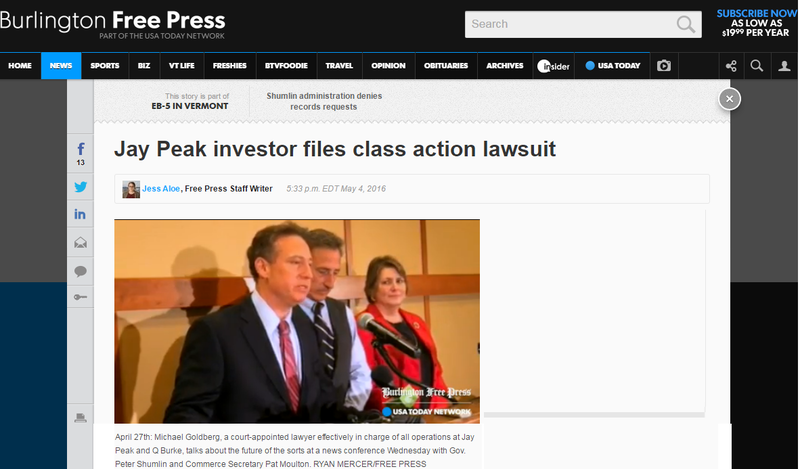Jay Peak investor files class action lawsuit
A Jay Peak investor has filed a class-action lawsuit in Miami federal court against Joel Burstein, Raymond James Financial Inc., Bill Stenger and Ariel Quiros.
Investor Alexandre Daccache filed the lawsuit in an attempt to recover the money "misused, commingled, and stolen by Quiros and Stenger with the assistance of Raymond James and Burstein" for all the investors, according to court documents. The lawsuit accuses the defendants of violating a federal racketeering law, or the RICO Act, which was designed to fight organized crime.
"The members of the RICO enterprise had a common purpose: to increase and maximize their profits by illegally diverting funds that they knew belonged to investors for improper and unauthorized purposes. Defendants shared the bounty of their enterprise by sharing the illegal profits generated by the joint scheme," Daccache's lawyer, Tucker Ronzetti, wrote in the complaint, filed Tuesday.
Last month, the Securities and Exchange Commission, along with the state of Vermont, accused Jay Peak developer Quiros and CEO Stenger of fraud related to the EB-5 program, which allows foreigners to gain U.S. residency if they invest $500,000 in projects in economically depressed areas. Burstein and Raymond James were not named as defendants in the SEC's case.
Jay Peak and Q Burke are in federal receivership, which places them under control of Michael Goldberg, a court-appointed lawyer.
Goldberg told reporters last week he had met, directly or indirectly, with hundreds of the investors. Ronzetti said his firm was coordinating with the receiver. The two have worked together on a number of occasions.
"We look forward to working closely with the receiver and trying to make all the investors whole," Ronzetti said.
Daccache is accusing Burstein, the broker on the Raymond James account holding investor funds and Quiros's former son-in-law, of substantially assisting Quiros and Stenger and failing in their fiduciary responsibility.
Daccache, a Brazilian citizen, invested $500,000 in August of 2010, as well as paying $50,000 in administrative fees. According to the complaint, Stenger told him he could expect returns of 2-6 percent annually, despite knowing the money would be diverted for unauthorized use or the personal gain of defendants.
The suit accuses Burstein and Raymond James of knowing Quiros was improperly using investor money. Raymond James gave "carte blanche to Quiros to do whatever he wanted with the Jay Peak Limited Partnerships investor funds, including paying himself and paying off both a $23 million margin loan and a $19 million margin loan to Raymond James," Ronzetti wrote.
In return, Raymond James made more than $2 million in interest from the margin loans, according to the complaint.
Burstein, Quiros and Stenger and lawyers for Quiros and Stenger did not return requests for comment.
Mentions
- Vermont EB5 Regional Center
- Jay Peak - Q Burke Mountain Resort, Hotel and Conference Center L.P.
- UNITED STATES SECURITIES AND EXCHANGE COMMISSION
- Ariel Quiros
- Bill Stenger
Litigation Cases
- State of Vermont vs Bill Stenger & Ariel Quiros
- UNITED STATES SECURITIES AND EXCHANGE COMMISSION vs Ariel Quiros & Bill Stenger
States
- Vermont
Securities Disclaimer
This website is for informational purposes only and does not constitute an offer or solicitation to sell shares or securities. Any such offer or solicitation will be made only by means of an investment's confidential Offering Memorandum and in accordance with the terms of all applicable securities and other laws. This website does not constitute or form part of, and should not be construed as, any offer for sale or subscription of, or any invitation to offer to buy or subscribe for, any securities, nor should it or any part of it form the basis of, or be relied on in any connection with, any contract or commitment whatsoever. EB5Projects.com LLC and its affiliates expressly disclaim any and all responsibility for any direct or consequential loss or damage of any kind whatsoever arising directly or indirectly from: (i) reliance on any information contained in the website, (ii) any error, omission or inaccuracy in any such information or (iii) any action resulting therefrom.




